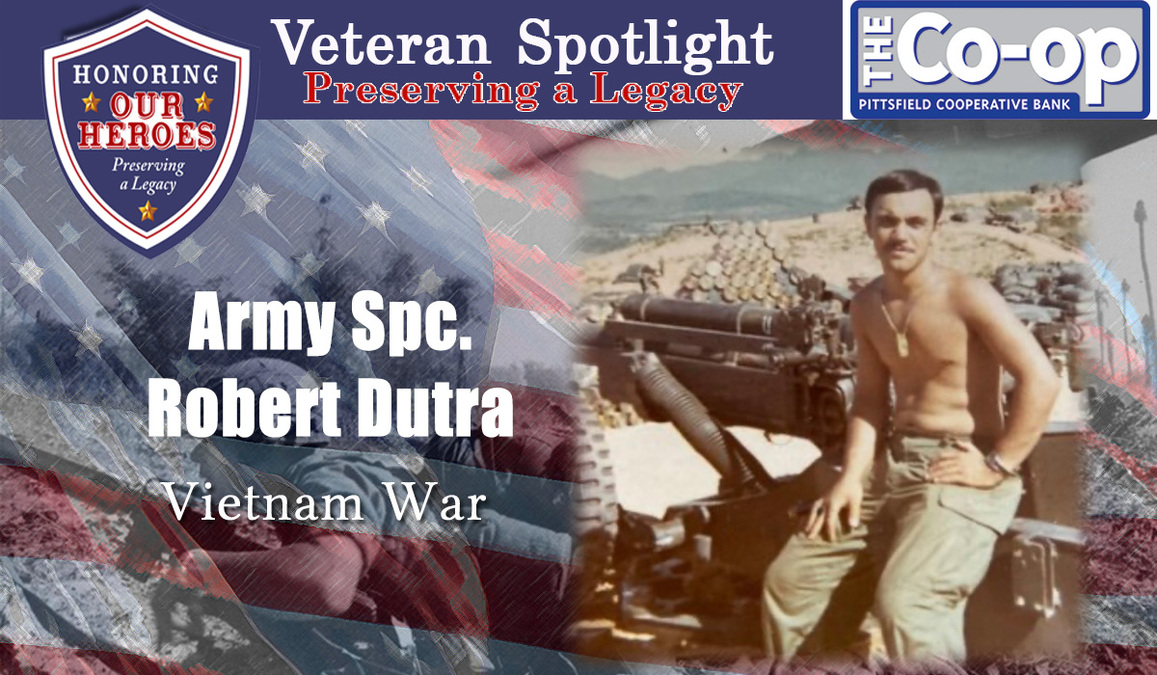

Veteran Spotlight: Army Spc. Robert Dutra
FALMOUTH, Mass. — Robert Dutra served his country in the Army in the Vietnam War as a specialist E-4.
He would do a 10-month tour as a combat soldier, from February to December of 1969.
A graduate of Lawrence High School, he initially joined the Army National Guard. His basic training would take him to Fort Leonard Wood, Mo.
"It was OK, I was 18. I didn't have anything. I was young, in shape and got to meet a few people," he recalled.
While at Fort Leonard Wood, he would also be assigned to four months of Advanced Infantry Training then sent to Fort Benning (now Fort Moore), Ga., and then, overseas to Vietnam at the end of February 1969.
"I was waiting in line like everyone else, the sergeant comes over told me to go into another line that was going to the LZ [landing zone]. I tried to explain that I was trained in radio and communications, he said, 'yeah right, get in that line.'"
"The plane was eerily quiet — nobody said anything. I knew nobody. When we landed all the stewardess' were hugging guys and crying as they got off," he said. "I thought, 'what did I get myself into?'"
Dutra would be assigned to the Central Highlands where combat and action was constant.
"I was with the 1st and 14th Artillery. We had six guns (howitzers). Then I got assigned to the 1st of the 96th Infantry of the Americal Division. the order would come down that we were moving," he recalled. "We always landed ahead of the guns and they took us about 10 miles on helicopters. We landed after they had sprayed Agent Orange. The chopper blades never stopped. You jumped and all the sand, debris and Agent Orange came right up in your face, eyes, in your mouth, on your skin. then you had to unstrap the guns.
"We always landed in an open field and always worried about snipers. That was the time to worry. On the LZ, they
had the perimeter surrounded with wire. A couple of times the enemy tried to break through, but they never got far."
How were the holidays? "Didn't really bother me. The next guy was in the same boat as you. The guys I felt sorry for were the guys that were married. They'd get a cassette from home, then go off by themselves and play it on a recorder and listen. It was tough for the older guys."
He shared this powerful story. "My father had sent me some linguica in a coffee can. He filled it with Crisco, then put the linguica in. I got it in a CARE package and shared it with everyone, that's what we did, cooked it right over a fire. Much better than sea rations."
He continued, "I never trusted the South Vietnamese. I was always leery of them, maybe it was me. I trusted the guys with the American flag on their uniforms. Night time was the worst, it was not a comfortable time. You can't see anything. The enemy could sneak up on you in a split second. I never slept well at night. You were always hot, sticky and sweaty.
"The infantry guys really had it tough. I had a lot of respect for those guys. When you got back to base camp, you
could take a shower — they poked two holes in a large drum, filled it with water, put faucets on it, then you had your shower. You had no idea what had been in those drums prior."
What was it like to lose a fellow soldier? Dutra became quiet.
"It kind of stuns you, kind of like a shock. It's something you never get over," he said. "I did run into a guy from New
Bedford when I was there. We talked a few times, one of the few bright spots."
Thoughts on his service and protestors?
"My fondest memory was when I got my notice to come home, I didn't like being there — all the casualties, deaths, then
just pick up and leave? The POWs, those guys were heroes to me, and the guys we left behind ... I haven't forgiven the protestors to this day. Everybody's entitled to their opinion but when you're there [in Vietnam], you like to have people behind you with a little support. We went through a lot and nobody wanted to be there."
He would go on to serve in his community in the Falmouth Fire Department for 32 1/2 years and continues to be one of the most respected and well-liked men in the town of Falmouth.
Spc. Bob Dutra, a long awaited welcome home and thank you for your service to our great country.
Wayne Soares is the host of the popular new veterans cooking show, "The Mess Hall" that airs Saturdays on NBC's NECN at 9:30 a.m. He also entertains our troops around the globe and is the host and producer of the Vietnam veterans documentary "Silent Dignity – The Chapter That Never Ends." He can be reached at waynesoares1@gmail.com.
Tags: veteran spotlight,
